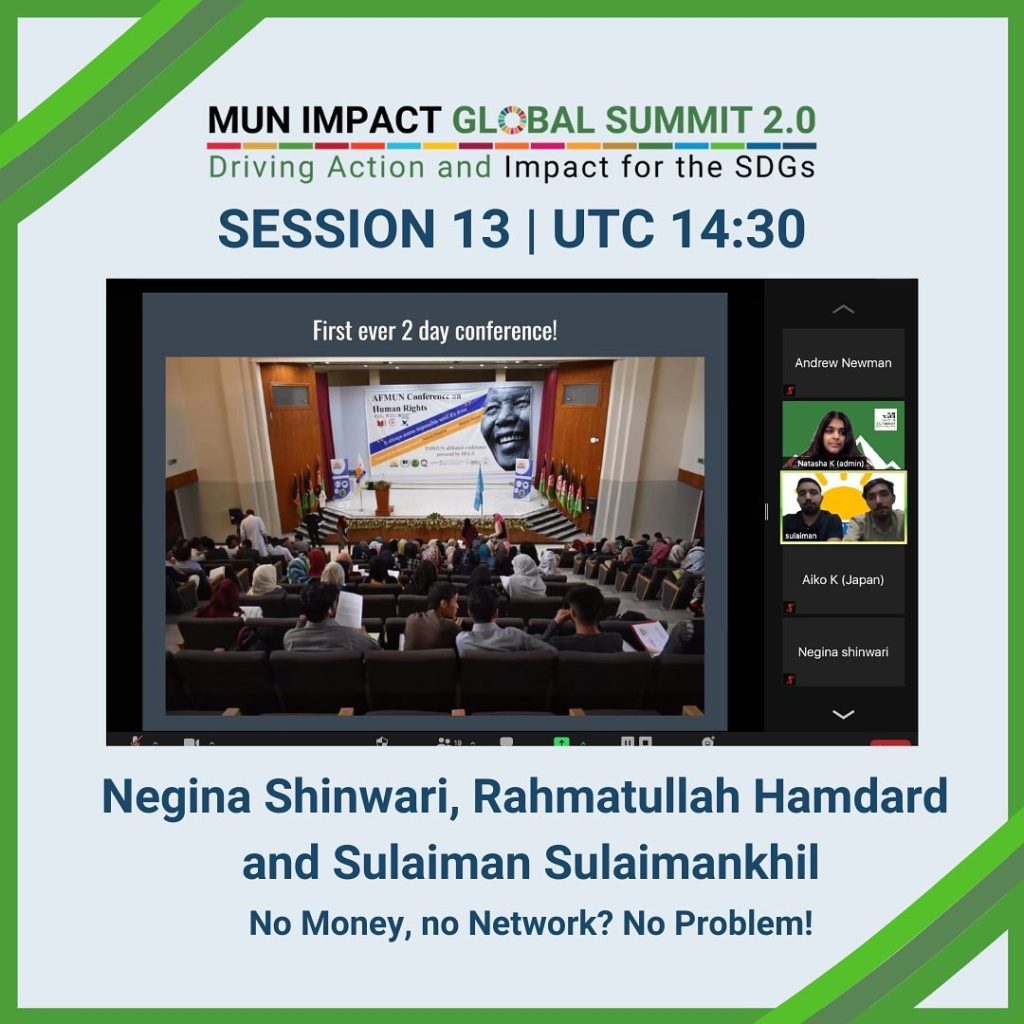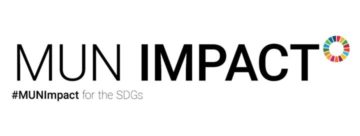
By Meenakshi Mariappan
–
Even in “a country that has experienced more than four decades of war,” Model UN has prevailed. In this session, Rahmatullah Hamdard, Sulaiman Sulaimankhil and Negina Shinwari from Afghanistan, shared their inspiring journey about how they introduced MUN in a conflict zone through the establishment of the ‘Hope for Education and Leadership in Afghanistan’ organisation (HELA). Firstly, Hamdard revealed “the different kinds of miseries” that accompanied the war by showing participants some distressing photographs of the state of the country. “The war,” he says, “is still here. The whole education system of the country was totally destroyed, it was weakened, it had no existence at the time.” Whilst this sets the context for the dire circumstances in which our speakers had to persevere, they echoed that “the children, the women, and the men chose hope over despair.”
It was in this conflict-torn backdrop that Model UN began to surface in Afghanistan, thanks to the efforts of our speakers for this session. Sulaimankhil shared the story of their modest beginnings by revealing that it all started whilst they were studying English at a UN compound with a UN representative. It was here that they came across the opportunity to participate in THIMUN Qatar 2015 as the first ever Afghan delegation to the conference. After undertaking the necessary training, the team traveled to partake in the conference, leaving as changed people with broader perspectives. They also revealed that people at the conference asked them this question: “What do you want to do when you return to your country?” And it was at this moment, that they became determined to “spread the knowledge with more Afghan youth.”
Initially, the group began the dissemination of MUN training in the country with “a small class of 10 boys and 10 girls, in a cold and dark space,” training the second Afghan delegation for THIMUN Qatar 2016. The speakers also fondly recalled the first one-committee (Security Council) conference they organised in a small office. Gradually, with the expansion of their network of donors and partners in Kabul, the group was able to organise their first, and very successful, one-day conference. “This was the time,” Sulaimankhil shared, “when the rise of MUN started in Kabul, and in Afghanistan. The youth began to understand the intellectual value of Model UN.” Shortly after, the team organised a two-day conference, and invited embassies in the region “to show them that MUN is important.” The HELA organisation now boasts an impressive record of providing over 500 students from 13 universities with MUN training each year, besides creating MUN clubs and organising several provincial conferences to select the best talents to invest in, who could then continue the legacy of spreading MUN in the country. Shinwari also mentioned that they had started the HELA women empowerment project called ‘Women in Business’ to mould the future businesswomen of the country. Moreover, the organisation had secured partnerships with the UNODC and the US embassy in Afghanistan, in addition to various others. The speakers proudly revealed that HELA had also sent delegates to conferences in India, THIMUN 2016, 2017, and 2018, and even the 15th anniversary of THIMUN at the Hague, Netherlands.
The speakers then proceeded to share what helped them reach where they are today. Firstly, Hamdard emphasised the importance of “having the right team, having the right network.” In truth, they expressed their thanks to their “partners from different corners of the world,” Ms Martin, former head of THIMUN Qatar, Mr Newman, from John Burroughs School, Mr Eckert, and Ms Sinclair from TASMUN — all current members of the MUN Impact Board — who played a role in HELA’s story. Sulaimankhil says, “they were the right people who pushed us. They helped, trusted and supported us. And we also convinced them that we were the right people, to help more youth in Afghanistan.”
More importantly, the speakers reinforced throughout the importance of commitment. Here, they uttered words of wisdom which hold true in any given circumstances:“If you don’t have commitment, you will never get to your goal.” They shared nostalgically that it was the “commitment of doing something, bringing some changes to our country, bring changes to the people,” which spurred their efforts further.
Whilst they faced numerous difficulties throughout this journey, they admitted that they “never minded.” Having grown from “nothing to something,” the HELA founders remarked that “MUN is not a time-passing thing. It is about the self growth aspect, the importance it has on a country level, on an education system level.” Although they realise that “HELA is still not a mature organisation, and we still have a long way to go,” they continue to persevere because “we have to be the ones who can bring hope to the youth, the hope of leadership and the hope of standard education.” If there is anything participants were able to take away from this inspiring session, it is the power of MUN, the power of committed individuals and the power of hope.
